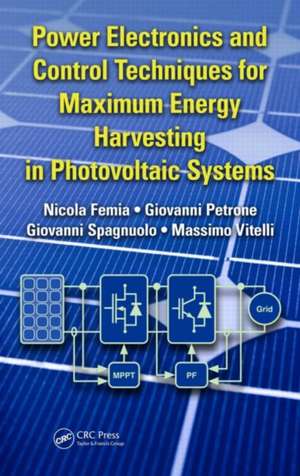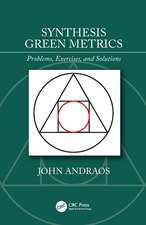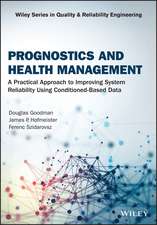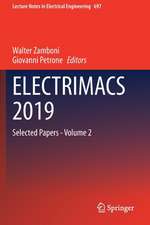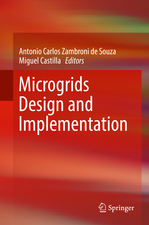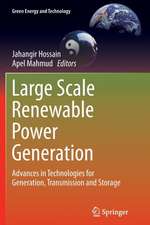Power Electronics and Control Techniques for Maximum Energy Harvesting in Photovoltaic Systems: Industrial Electronics
Autor Nicola Femia, Giovanni Petrone, Giovanni Spagnuolo, Massimo Vitellien Limba Engleză Hardback – 18 dec 2012
Tools to Help You Improve the Efficiency of Photovoltaic Systems
The book supplies an overview of recent improvements in connecting PV systems to the grid and highlights various solutions that can be used as a starting point for further research and development. It begins with a review of methods for modeling a PV array working in uniform and mismatched conditions. The book then discusses several ways to achieve the best maximum power point tracking (MPPT) performance. A chapter focuses on MPPT efficiency, examining the design of the parameters that affect algorithm performance. The authors also address the maximization of the energy harvested in mismatched conditions, in terms of both power architecture and control algorithms, and discuss the distributed MPPT approach. The final chapter details the design of DC/DC converters, which usually perform the MPPT function, with special emphasis on their energy efficiency.
Get Insights from the Experts on How to Effectively Implement MPPT
Written by well-known researchers in the field of photovoltaic systems, this book tackles state-of-the-art issues related to how to extract the maximum electrical power from photovoltaic arrays under any weather condition. Featuring a wealth of examples and illustrations, it offers practical guidance for researchers and industry professionals who want to implement MPPT in photovoltaic systems.
Preț: 1006.60 lei
Preț vechi: 1227.57 lei
-18% Nou
Puncte Express: 1510
Preț estimativ în valută:
192.62€ • 205.97$ • 160.60£
192.62€ • 205.97$ • 160.60£
Carte tipărită la comandă
Livrare economică 18 aprilie-02 mai
Preluare comenzi: 021 569.72.76
Specificații
ISBN-13: 9781466506909
ISBN-10: 1466506903
Pagini: 366
Ilustrații: 260 black & white illustrations, 16 black & white tables
Dimensiuni: 156 x 234 x 28 mm
Greutate: 0.64 kg
Ediția:1
Editura: CRC Press
Colecția CRC Press
Seria Industrial Electronics
Locul publicării:Boca Raton, United States
ISBN-10: 1466506903
Pagini: 366
Ilustrații: 260 black & white illustrations, 16 black & white tables
Dimensiuni: 156 x 234 x 28 mm
Greutate: 0.64 kg
Ediția:1
Editura: CRC Press
Colecția CRC Press
Seria Industrial Electronics
Locul publicării:Boca Raton, United States
Public țintă
Researchers and industry professionals working in power electronics, power systems, renewable energies, and industrial electronics.Cuprins
PV Modeling. Maximum Power Point Tracking. MPPT Efficiency: Noise Sources and Methods for Reducing Their Effects. Distributed Maximum Power Point Tracking of Photovoltaic Arrays. Design of High-Energy-Efficiency Power Converters for PV MPPT Applications.
Recenzii
"… very innovative … provides a very rigorous analytical treatment starting from the modeling of the PV field and the power converter stages as well as the dynamics of the overall system, including MPPT control. This in-depth analytical description allows the design of power converters and DMPPT algorithms improving the overall efficiency of the whole PV system operating under mismatching conditions."
—Dr. Francesc Guinjoan, Polytechnic University of Catalonia, Barcelona, Spain
"… a concise but complete compendium of the required knowledge to understand, design, and control photovoltaic systems. … a good introduction to photovoltaic systems … also presents most of the recent advances on photovoltaic optimization … the authors are very well known in the scientific community, which provides confidence on the equations and conclusions given in the book."
—Carlos Andres Ramos Paja, Universidad Nacional de Colombia
—Dr. Francesc Guinjoan, Polytechnic University of Catalonia, Barcelona, Spain
"… a concise but complete compendium of the required knowledge to understand, design, and control photovoltaic systems. … a good introduction to photovoltaic systems … also presents most of the recent advances on photovoltaic optimization … the authors are very well known in the scientific community, which provides confidence on the equations and conclusions given in the book."
—Carlos Andres Ramos Paja, Universidad Nacional de Colombia
Notă biografică
Nicola Femia is a full professor of electrotechnics at the University of Salerno, where he teaches circuit theory and power electronics and leads the Power Electronics and Renewable Sources Laboratory. He has been responsible for research and education projects in collaboration with several industries, including Magnetek, National Semiconductor, STMicroelectronics, PowerOne, and Texas Instruments. He is co-author of more than 140 scientific papers published in international journals and in the proceedings of international conferences. He is co-author of five patents regarding control techniques and power converters for photovoltaic applications.
Giovanni Petrone is an assistant professor in the Department of Electronic Engineering and Computer Science at the University of Salerno, where he teaches electrotechnics and power electronic circuits for renewable energy sources. He is involved in several research projects with international companies and institutions and has also assumed responsibility for some Italian research projects supported by public funds. He is co-author of five patents and several scientific papers published in international journals and in the proceedings of international symposia.
Giovanni Spagnuolo is an associate professor of electrical engineering at the University of Salerno. He is the project leader of two European projects Leonardo Da Vinci and FP7 and one PRIN 2008 project financed by the Italian Ministry of University and of Scientific and Technological Research (MURST), and he is the coordinator of research contracts financed by National Semiconductors Corporation, Matrix S.r.l., and Bitron Industrie S.p.A. He is co-author of six patents and the author or co-author of more than 140 papers published in international journals and in the proceedings of international conferences. He is editor of the IEEE Journal of Photovoltaics and associate editor of the IEEE Transactions on Industrial Electronics.
Massimo Vitelli is a full professor in the Department of Industrial and Information Engineering at the Second University of Naples, where he teaches electrotechnics and power electronics. He has been engaged in a number of scientific national projects financed by the Italian Ministry of University and of Scientific and Technological Research (MURST) and by the National Science Foundation (CNR) and in many research contracts with industries. He is co-author of six national and international patents and of about 180 papers published in scientific journals or in international conference proceedings.
Giovanni Petrone is an assistant professor in the Department of Electronic Engineering and Computer Science at the University of Salerno, where he teaches electrotechnics and power electronic circuits for renewable energy sources. He is involved in several research projects with international companies and institutions and has also assumed responsibility for some Italian research projects supported by public funds. He is co-author of five patents and several scientific papers published in international journals and in the proceedings of international symposia.
Giovanni Spagnuolo is an associate professor of electrical engineering at the University of Salerno. He is the project leader of two European projects Leonardo Da Vinci and FP7 and one PRIN 2008 project financed by the Italian Ministry of University and of Scientific and Technological Research (MURST), and he is the coordinator of research contracts financed by National Semiconductors Corporation, Matrix S.r.l., and Bitron Industrie S.p.A. He is co-author of six patents and the author or co-author of more than 140 papers published in international journals and in the proceedings of international conferences. He is editor of the IEEE Journal of Photovoltaics and associate editor of the IEEE Transactions on Industrial Electronics.
Massimo Vitelli is a full professor in the Department of Industrial and Information Engineering at the Second University of Naples, where he teaches electrotechnics and power electronics. He has been engaged in a number of scientific national projects financed by the Italian Ministry of University and of Scientific and Technological Research (MURST) and by the National Science Foundation (CNR) and in many research contracts with industries. He is co-author of six national and international patents and of about 180 papers published in scientific journals or in international conference proceedings.
Descriere
This reference examines control circuits, systems, and techniques for maximizing the electrical power produced by a photovoltaic (PV) source under any weather conditions. The book begins with a review of modeling methods. It then discusses how to achieve the best maximum power point tracking (MPPT) performance and how to design the parameters that affect algorithm performance. The authors also address the maximization of the energy harvested in mismatched conditions. The final chapter looks at the design of DC/DC converters, with special emphasis on their energy efficiency.
